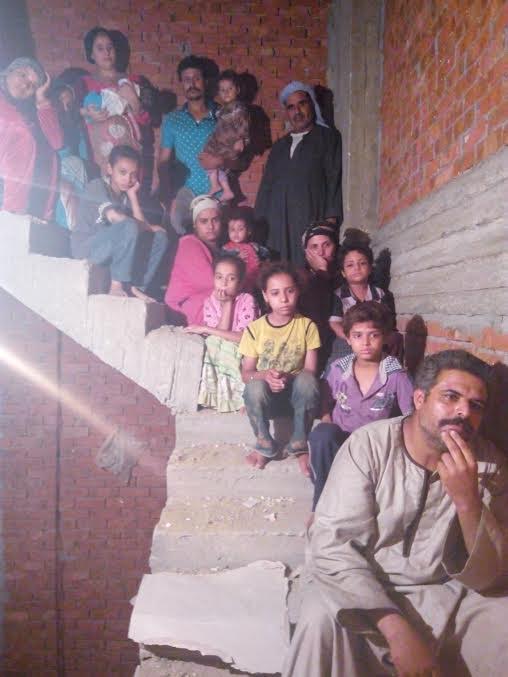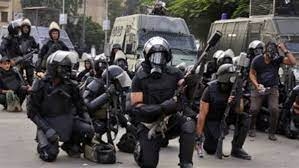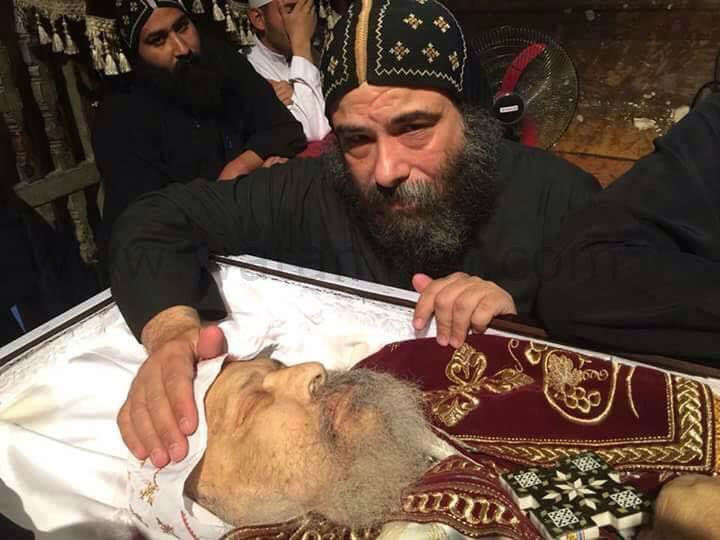That many Copts in Egypt are victims of attacks by fanatic Muslims is a fact beyond dispute. That in the wide majority of cases the victimised Copts are coerced into licking their wounds or ‘conciliating’ with their attackers is another fact on the ground in Egypt. Traditional conciliation is an old practice widespread in rural Egypt where community elders orchestrate out-of-court settlements between offenders and victims for the sake of social peace. In cases where Copts are attacked, however, conciliation is never impartial; it further oppresses the Copts who are coerced through intolerable pressure or threats into agreeing to unjust terms imposed upon them, while at the same time giving up all their legal rights. In our modern world of today, local politicians and security officials forsake their role in serving justice and join the local elders in imposing unjust conciliation upon the Copts.
Watani has on file a seemingly unending string of incidents in which the Copts were attacked and forced into conciliation. [https://en.wataninet.com/coptic-affairs-coptic-affairs/sectarian/sweeping-the-law-aside-2/16545/] It would indeed appear as though there was no escaping conciliation; the only other alternative would be for the victimised Copts to drag their families out of their home villages or towns and start over again somewhere where no one knows anything about them. But this is much easier said than done; on the ground it involves almost unsustainable difficulties and intolerable pain.
So what happens if Copts reject conciliation and rebel against their traditional role as victims? This appears to be precisely what the Copts of the village of Koum al-Loufi in Minya, some 250km south of Cairo, opted for.
Statement by Koum al-Loufi Copts
“We, the Copts of Koum al-Loufi, Samalout, Minya, have been victims of unjust attacks by fundamentalists on 30 June 2016. Our homes were burned, and we have since been homeless. We have been under relentless pressure and threats to succumb to ‘conciliating’ with those who attacked us, forgoing thus the rule of law and relinquishing all our legal rights. On 7 August 2016, the suspects who had burned our homes and who had so far been detained by the police were released on bail. They publicly threatened us should we not succumb to conciliation. We left our village to Cairo, to place our plight before the relevant officials. We hoped to be saved from the oppression and injustice inflicted upon us; we have been stripped of our most basic rights as Egyptian citizens for no crime other than our desire to live in peace and dignity.
“In respect and appreciation of the efforts by Pope Tawadros II and Anba Pavnotius, Metropolitan of Samalout, to work a peaceful resolution to our predicament; also of promises to us by parliament that our usurped rights will be regained, our homes rebuilt, our losses indemnified, our families protected, and our legal and constitutional rights secured … In respect and appreciation of this, and of everyone who worked towards resolving our predicament … also in view of how much we care for the safety of our homeland … we have decided to go back home even though we have no homes to go back to, seeing that our homes are now no more than burnt ruins. We have honoured our part of the pledge with the House of Representatives [parliament].
“We will, together with our children, patiently bear our suffering until our homes are rebuilt and we can go back to live in them.”

The attack
The statement, issued on 11 August, was signed by the four Copts whose homes were burned: Ayoub Khalaf Fahmy, Ibrahim Khalaf Fahmy, Younan Khalaf Fahmy, and Amir Khalaf Fahmy. As is obvious, they are all brothers.
The story goes back to 30 June 2016 when fanatic Muslims set fire to four Coptic-owned houses in the Minya village of Koum al-Loufi on suspicion that one of them would be turned into a church. The houses, which are close to one another, belong to the Khalaf Fahmy brother; three of them incurred severe damages. Ashraf and Ibrahim Khalaf’s houses were still under construction.
A rumour had spread in the village that one of the Khalaf houses would be turned into a church. Even though the police made the Khalafs sign pledges that the houses they were building would be used for residence and not for practising religious rites, a fanatic Muslim mob waged an attack against the Copts in the village during the late hours of Wednesday 29 June. To cries of Alluhu Akbar (Allah is the Greatest) they set fire to the Khalaf houses, blocked the way before the fire fighting truck which was attempting to enter the village, and clashed with the police. Ibrahim Khalaf said that the mob beat their children. “We rescued the children from the hands of the fanatics as they continued to scream Allahu Akbar,” he said.
The Khalafs were evicted out of their home and have since been homeless.
The government announced it would compensate the Copts for their losses, to the tune of the paltry sum of EGP40,000 all in all.
The police arrested 19 Muslim suspects. Investigations are ongoing.

No conciliation
The Koum al-Loufi Copts were exposed to relentless pressure as well as threats by the Muslim villagers to ‘conciliate’ with the attackers, that is to reach an out-of-court settlement upon which they relinquish their legal rights. The terms of such traditional conciliations, which are orchestrated by the Muslim village elders and the local politicians and security officials, have invariably been oppressive to the Copts. The Khalafs have until now resisted conciliation and insisted on implementation of the law, despite the threats and the fact that they are still homeless. They have had to cram their families into a garage owned by a relation who generously offered it to them for temporary residence. Yet they have been beaten up in the village streets and threatened with more violence should they insist on rejecting conciliation. The entire Coptic population of Koum al-Loufi have been threatened with collective revenge should the Khalafs refuse to conciliate. Many Copts, fearing for the safety of their families, have already fled the village.
“But we are almost under house arrest,” Ashraf Khalaf said, “We can’t go out because of all the threats. We definitely refuse conciliation, but how long can we hold out? Especially given that there is also pressure on us from our local MPs and Beit al-Aila to accept conciliation? And how long will it take for justice to be served?” Beit al-Aila is a State-sponsored council formed of representatives of al-Azhar and the Church, as well as a number of Muslim and Coptic laity whose prime purpose is to abort sectarian violence. The council, however, has done nothing of the sort and has instead, led by al-Azhar Grand Imam Sheikh Ahmed al-Tayyeb, attempted to cover up violence against Copts through the so-called conciliation sessions.
The Khalafs stood their ground, however.

Suspects released
On 7 August, the Koum al-Loufi Copts were stunned at a decision by Minya judicial authorities to release the suspects who had been held pending investigation on bail of EGP1000 each. The decision involved procedural irregularities that were, under the circumstances, inexplicable and unpardonable. It was based on so-called contradictions between the results of the police investigation with the testimony of the victims, and a claim that there was no incriminating evidence against the detainees regarding all the charges against them. Once the suspects were freed, the village turned into a field of vicious stone-throwing against the Coptic villagers and their homes, with explicit threats of violence against them.
Feeling and fearing it was a prelude to pronouncing the offenders innocent of attacking them and burning their homes, and sensing that Minya authorities were protective of the Muslim offenders, a delegation of Copts decided to head to Cairo to meet relevant officials and lawmakers. “We will hold our protest in Cairo,” Ashraf Khalaf said. “We feel we have been subject to injustice, oppression, and threats, but not one official in Minya lifted a finger to bring us justice.”
In Cairo, the Copts demonstrated in front of the House of Representatives. MP Tamer Tawheed of Samalout, went out to them. He attempted to downplay the entire crisis by denying that there had been any fires and by telling the Copts: “You won’t be able to live peacefully without agreement with the villagers.” To which the outraged Ibrahim and Ashraf Khalaf vehemently replied: “We are the villagers.” The loud-voiced argument which ensued led MP Ali Meseilhi and the MPs Emad Gad and Nadia Henry to obtain permission for the Koum al-Loufi Copts to be admitted into parliament and given a hearing.

Parliamentary hearing
MP Meseilhi, head of the Economics Committee in parliament, presided over the hearing. It was a stormy one; participants were astounded that Minya MPs took to denying that Copts in Minya were victim to any injustice. MPs Khaled Shaaban and Haytham al-Hariri at once corrected Minya MPs by reminding them that Minya was statistically the highest in Egypt where attacks against Copts were concerned. Instead of denying that flagrant fact, they said, Minya MPs should be looking into the causes of that dire situation and thinking up remedies. Later in the hearing, when Ashraf Khalaf described how he and his brother toured the Coptic homes in Koum al-Loufi and got the Copts to join him in signing a pledge that the house under construction was for residential use and would not be used as a church, a wrathful MP Shaaban expressed extreme outrage at the indignity the Copts were obliged to sustain.
Yet Minya MPs were adamant it was not so. MP Ali al-Kayyal of Samalout sharply said that Ashraf Khalaf had once told him the Copts in Koum al-Loufi wanted a church, “meaning he intended to build a church himself.” This brought on a string of indignant mockery from other MPs who resented that the desire of building a church in the village should be considered a legal infringement. MP Ihab Mansour of Umraniya, Giza, cried out: “Oh God forbid! May Great Allah forgive us!” MP Nadia Henry expressed amazement at what she described as MP Kayyal’s attempt to justify the crime committed by fanatics. Finally, MP Meseilhi said that the fact remains that there are persons who have been attacked and rendered homeless; it was only right that their homes should be repaired and they should be compensated.
Persistence
The hearing closed with resolutions that the Copts should go back to their home village in peace and be accorded all necessary protection; they should be compensated for their losses, their homes rebuilt, and their legal and constitutional rights secured.
Accordingly, Koum al-Loufi Copts boarded a bus and headed home.
It must be noted that the village of Koum al-Loufi is home to some 1800 Copts and has no church; the villagers have to travel to worship in the nearest village that includes a church. Ten years ago, according to Anba Pavnotius, an application was filed with the relevant authorities for licence to build a church in Koum al-Loufi, but no such licence was given until now. A few years ago the Copts used the ground floor of a local building to hold religious ceremonies, but the village Muslims got wind of that. The local security officials, fearing unrest or rioting, closed down the place.
Watani goes to press as the Khalaf houses are being rebuilt by Minya governorate. There have been negotiations between the local security authorities and the village elders to reopen the closed building which the Copts formerly used for prayer, but the village Muslims have been adamant that: “we want no church here.” They have been applying pressure on the authorities to go back on their offer to reopen that building.
The five weeks between 17 June 2016 and 22 July 2016 saw an unprecedented number of attacks against Copts on suspicion of building churches. This occurred in the Alexandria, Amriya village of al-Beida on 17 June; Koum al-Loufi, Minya, on 30 June; Abu-Yacoub, Minya, on 15 July; and Saft al-Kharsa, Beni Sweif, on 22 July. In all the cases except Koum al-Loufi, the Copts were pressured into conciliating.
Watani International
17 August 2016
















